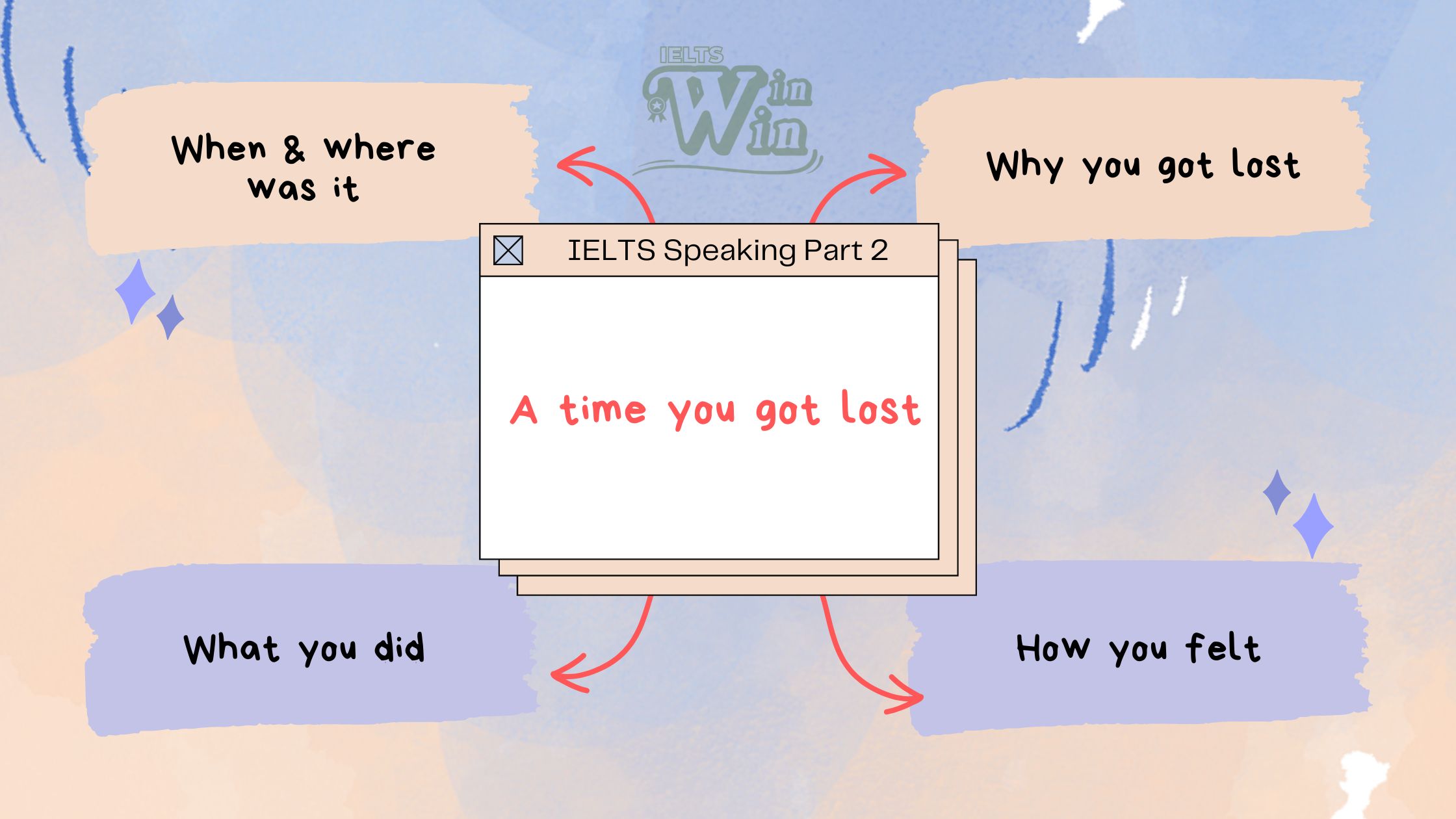✨Part 2: A time you got lost
- When & where
- Why you got lost
- What you did
- How you felt
It was a sunny day in Singapore, and I was filled with excitement and curiosity as I embarked on a solo adventure to explore the vibrant city. Little did I know that this day would unfold into an unexpected and memorable experience of getting lost in a foreign land.
A couple of years ago, during my visit to Singapore as a foreigner, I found myself lost in the bustling streets of the city. It happened when I was exploring the intricate network of roads and unfamiliar neighborhoods. Feeling a mix of frustration and curiosity, I remained calm and used my smartphone's navigation app to find my way back. I also approached some locals for help, and they graciously provided me with directions and guidance. With their assistance, I slowly but surely made my way back to more familiar areas. The initial stress of being lost turned into relief and a sense of accomplishment as I navigated through the busy streets once again.
As I reflect on that incident of getting lost in Singapore, I am reminded of the valuable lessons it taught me. It was a humbling reminder of the importance of adaptability, seeking help when needed, and embracing the unknown with an open mind. Through this experience, I not only discovered hidden corners of the city but also gained a deeper appreciation for the kindness of strangers and the resilience within myself. Getting lost became a memorable part of my journey, reminding me that sometimes the most extraordinary moments arise from unexpected detours.
- curiosity /ˌkjʊərɪˈɒsəti/ (n) - tính tò mò, sự ham muốn tìm hiểu
- embarked /ɛmˈbɑːkt/ (v) - bắt đầu, lên tàu, lên đường
- unexpected /ˌʌnɪkˈspɛktɪd/ (adj) - bất ngờ, không ngờ tới
- unfamiliar /ʌnfəˈmɪliə(r)/ (adj) - không quen thuộc, lạ lẫm
- frustration /frʌsˈtreɪʃn/ (n) - sự thất vọng, sự nản lòng
- assistance /əˈsɪstəns/ (n) - sự giúp đỡ, trợ giúp
- accomplishment /əˈkʌmplɪʃmənt/ (n) - thành tựu, thành tích
- humbling /ˈhʌmblɪŋ/ (adj) - khiến cho ai cảm thấy nh humbled, khiêm tốn
- adaptability /əˌdæptəˈbɪləti/ (n) - tính thích nghi, tính linh hoạt
- discovered /dɪsˈkʌvəd/ (v) - khám phá, tìm ra, phát hiện
Part 3
✨Who are more likely to get lost? Young or old people?
There is no definitive answer to who is more likely to get lost as it depends on various factors. Younger people, especially children, may have less experience with navigation and may get lost more easily in unfamiliar places. Older people, particularly those experiencing cognitive decline or memory impairments, may also face challenges with orientation and directions. However, it is important to note that individuals of any age can potentially get lost depending on their familiarity with the surroundings, level of preparedness, and the complexity of the environment.
- navigation /ˌnævɪˈɡeɪʃn/ (n) - sự định hướng, định vị, điều hướng
- orientation /ˌɔːrɪənˈteɪʃn/ (n) - sự định hướng, sự phương hướng
- preparedness /prɪˈpeədnəs/ (n) - sự chuẩn bị, sự sẵn sàng
✨How do people feel when they get lost?
When people get lost, they may experience a range of emotions including anxiety, frustration, confusion, and even fear. The feeling of being disoriented and uncertain about one's location or how to reach a desired destination can be distressing. People may feel a loss of control or a sense of vulnerability, especially in unfamiliar or unsafe surroundings. However, the intensity of these emotions can vary depending on the individual, their level of preparedness, and the context of getting lost.
frustration /frʌsˈtreɪʃn/ (n) - sự thất vọng, sự nản lòng
- uncertain /ʌnˈsɜːtn/ (adj) - không chắc chắn, không quyết định được
- individual /ˌɪndɪˈvɪdʒuəl/ (adj) - cá nhân, riêng biệt
✨What should people do when they get lost?
When people find themselves lost, it is important to stay calm and try to regain their bearings. They can look for familiar landmarks, ask for directions from reliable sources such as locals or authorities, or use navigational tools such as maps or GPS devices. If possible, finding a safe and well-populated area to seek assistance is advisable. It can also be helpful to have a contingency plan in place beforehand, such as sharing travel itineraries with others or carrying emergency contact information.
- directions /dɪˈrekʃnz/ (n) - hướng dẫn, chỉ dẫn, lời chỉ thị
- authorities /ɔːˈθɒrətiːz/ (n) - các nhà chức trách, các cơ quan chức năng
- navigational /ˌnævɪˈɡeɪʃənl/ (adj) - liên quan đến điều hướng, định vị
- advisable /ədˈvaɪzəbl/ (adj) - khôn ngoan, nên làm, tốt để làm
- itineraries /aɪˈtɪnərəriz/ (n) - hành trình, lịch trình
✨Is it easier for people to get lost now than it was in the past? Why?
In some ways, it can be argued that it is easier for people to get lost nowadays compared to back then. With the advent of advanced technology and reliance on navigation apps, people may rely heavily on electronic devices and have reduced map-reading skills. This dependence on digital navigation can be problematic if there is no access to technology or if the devices fail. Additionally, the increased urbanization and complexity of modern cities, along with globalization and international travel, can present unfamiliar environments and challenges in navigating through them. Ultimately, while technology has provided convenience and efficiency in many aspects of our lives, it is important to maintain basic navigation skills and a sense of direction to mitigate the risk of getting lost in unfamiliar surroundings.
- problematic /ˌprɒbləˈmætɪk/ (adj) - gây rắc rối, khó giải quyết
- urbanization /ˌɜːbənaɪˈzeɪʃn/ (n) - sự đô thị hóa, quá trình đô thị hóa
✨Why are some people better at reading maps?
Some people may be better at reading maps due to various factors. Spatial awareness and the ability to mentally visualize and interpret spatial relationships can contribute to map-reading skills. Some individuals may have a natural aptitude for understanding and interpreting visual information. Additionally, experience and familiarity with maps, geography, and navigational concepts can enhance map-reading abilities. Practice and exposure to different types of maps can also improve one's proficiency in map-reading.
- awareness /əˈweənəs/ (n) - sự nhận thức, sự hiểu biết
- visualize /ˈvɪʒjʊəlaɪz/ (v) - hình dung, tưởng tượng, mường tượng
- exposure /ɪkˈspəʊʒə(r)/ (n) - sự tiếp xúc, sự phơi bày, sự chịu ảnh hưởng
✨Is getting lost really a bad thing?
Getting lost can be seen as a temporary setback or a learning opportunity rather than a wholly negative experience. While it may cause initial discomfort or inconvenience, getting lost can lead to new discoveries, unexpected adventures, and a chance to develop problem-solving and resilience skills. It can provide opportunities for individuals to explore unfamiliar environments, engage with locals, and develop a deeper understanding of a place. However, it is important to prioritize personal safety and take necessary precautions when navigating unknown areas.
- inconvenience /ˌɪnkənˈviːniəns/ (n) - sự bất tiện, phiền hà
- prioritize /praɪˈɒrɪtaɪz/ (v) - ưu tiên, đặt sự ưu tiên cao hơn
✨Why do some people like traveling around without a map?
Some people enjoy traveling without a map because it allows them to embrace spontaneity and serendipity. They may find joy in the element of surprise, discovering hidden gems, and stumbling upon unexpected experiences. Traveling without a map can foster a sense of adventure and freedom, enabling individuals to fully immerse themselves in their surroundings without the constraints of predetermined routes or itineraries. It can also encourage interaction with locals and a deeper connection with the destination.
- spontaneity /ˌspɒntəˈneɪəti/ (n) - tính tự phát, tính tự nhiên
- stumbling /ˈstʌmblɪŋ/ (adj) - gây khó khăn, gây trở ngại
- predetermined /ˌpriːdɪˈtɜːmɪnd/ (adj) - đã được quyết định trước, đã được định trước
✨Are paper maps important now? Will they disappear?
Although digital maps and navigation systems have become increasingly prevalent, paper maps still hold value and are unlikely to disappear entirely. Paper maps provide a tangible and reliable backup option, especially in areas with limited or no internet connectivity. They allow for a broader perspective and can be beneficial for planning, visualizing large-scale routes, and gaining a sense of geographic context. Paper maps also hold nostalgic and aesthetic appeal for many people. While their usage may have decreased, paper maps continue to serve a purpose and are valued by travelers, adventurers, and enthusiasts of cartography.
- tangible /ˈtændʒəbl/ (adj) - rõ ràng, có thể chạm được, có thể cụ thể hóa
- nostalgic /nɒˈstældʒɪk/ (adj) - hoài niệm, nhớ lại quá khứ
- aesthetic /iːsˈθetɪk/ (adj) - thẩm mỹ, có tính thẩm mỹ
- enthusiasts /ɪnˈθjuːziæsts/ (n) - những người đam mê, những người say mê
- cartography /kɑːˈtˌɒɡrəfi/ (n) - bản đồ học, khoa học vẽ bản đồ
Xem thêm các bài viết về Speaking Part 2 và 3 ở đây bạn nhé
Đừng ngần ngại để lại thông tin hoặc liên hệ với chúng mình qua địa chỉ sau đây để IELTS WinWin có thể hỗ trợ tốt nhất cho bạn nhé!
Địa chỉ: 118 Nguyễn Xuân Khoát, P. Tân Thành, Q. Tân Phú, TP. Hồ Chí Minh.
Fanpage: IELTS WinWin
Zalo: 0965 439 239 – 085 301 8788
Website: ieltswinwin.com



